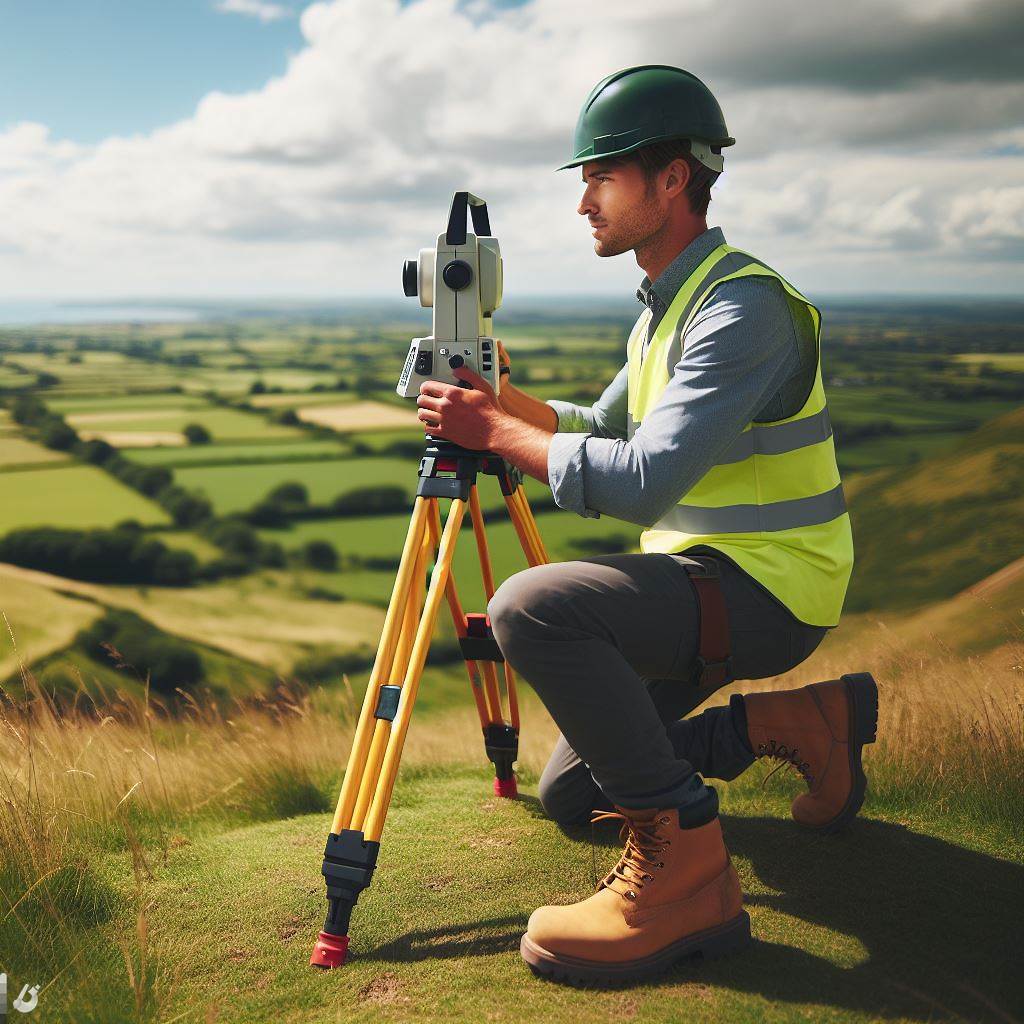Introduction
Surveyors play a crucial role in ensuring environmental protection in the UK.
As professionals responsible for assessing land and property, they are keenly aware of the impact of their work on the environment.
Environmental protection holds great significance not only for surveyors but also for various other professions.
In this blog post, we will explore the importance of environmental protection in surveying and related professions and how surveyors can actively contribute to this cause.
Overview of Surveyors in the UK
The role and responsibilities of surveyors in the UK are crucial in ensuring accurate measurements, assessing property conditions, and providing advice for construction and development projects.
Types of Surveyors
- Building surveyors: These professionals inspect buildings to assess their condition and provide reports.
- Land surveyors: They measure and map land areas for various purposes such as property boundaries and construction projects.
- Quantity surveyors: These experts estimate and manage costs for construction projects, including materials and labor.
Significance of Surveyors in Construction and Development Projects
Surveyors play a vital role in construction and development projects by:
1. Accurate Measurements and Assessments
Surveyors are responsible for measuring and assessing different aspects of a project, such as land boundaries, building conditions, and quantities of materials needed.
Their accurate measurements and assessments are crucial for ensuring that the project progresses smoothly.
2. Compliance with Regulations
Surveyors ensure that construction and development projects comply with local regulations, building codes, and zoning laws.
They assess whether the design and construction methods align with safety standards and legal requirements, protecting the environment and public safety.
3. Identifying and Managing Risks
Surveyors identify potential risks associated with construction projects, such as unstable soil conditions or environmental factors.
By conducting thorough surveys and assessments, they can devise strategies to mitigate risks and avoid costly delays or accidents.
4. Cost Estimation and Budget Management
Quantity surveyors play a crucial role in estimating the costs of construction materials, labor, and other project expenses.
They ensure that the budget is realistic and that costs are accurately allocated throughout the project, helping to control expenses and avoid financial setbacks.
5. Environmental Protection
Surveyors play a significant role in protecting the environment during construction and development projects.
They ensure that projects are designed and executed in a way that minimizes ecological impact and maximizes sustainability.
6. Conflict Resolution
Surveyors are often called upon to resolve disputes related to property boundaries, construction defects, or disputes between contractors and developers.
Their expertise and impartiality help ensure fair and equitable resolution of conflicts.
7. Project Management Support
Surveyors provide essential support to project managers by assisting with planning, scheduling, and monitoring construction and development projects.
They ensure that the project progresses on time and within budget.
In fact, surveyors in the UK play a crucial role in construction and development projects.
Their responsibilities include accurate measurements and assessments, compliance with regulations, risk management, cost estimation, environmental protection, conflict resolution, and project management support.
Without surveyors, these projects would face numerous challenges and risks.
Read: Internships in UK Electrical Engineering
Environmental Protection and Surveyors
Surveyors play a vital role in environmental protection efforts in the UK.
They are responsible for conducting surveys and assessments to ensure that development projects are in line with environmental regulations.
By considering environmental factors, surveyors can help minimize the negative impacts of construction and development on the natural environment.
Personalized UK Career Consulting
Receive tailored career guidance designed just for you. Get actionable steps and expert support to boost your career in 1-3 days. Take control of your career now.
Get StartedThis not only benefits the environment but also safeguards the health and well-being of communities.
Relationship between surveyors and environmental protection
Here are a few key points highlighting the relationship between surveyors and environmental protection:
- Understanding Environmental Impact: Surveyors have a deep understanding of environmental impact assessments.
- Evaluating Development Plans: They evaluate proposed development plans to identify potential environmental risks.
- Assessing Ecological Resources: Surveyors assess the presence of ecological resources like wetlands, wildlife habitats, and protected species.
- Identifying Risks: They identify risks of contamination, pollution, and erosion that may arise from construction activities.
- Collaboration with Environmental Experts: Surveyors collaborate with environmental experts to ensure compliance with regulations.
- Advising on Best Practices: Surveyors provide guidance to developers on best practices for minimizing environmental impact.
The importance of considering environmental factors in surveying projects cannot be overstated.
Failure to do so can have detrimental consequences for the environment and lead to legal and reputational issues for developers.
Why environmental considerations are crucial in surveying
- Preserving Biodiversity: Surveying helps identify areas of high biodiversity value, enabling their protection and conservation.
- Preventing Habitat Destruction: By considering environmental factors, surveyors can prevent the destruction of valuable habitats.
- Safeguarding Water Quality: Surveying ensures that development projects do not negatively impact water bodies, preserving water quality.
- Minimizing Soil Erosion: By assessing soil conditions, surveyors can recommend measures to prevent erosion and preserve fertile land.
- Protecting Cultural Heritage: Surveyors identify and preserve cultural heritage sites during construction projects.
Surveyors can actively contribute to environmental protection efforts through their expertise and knowledge.
Here are a few examples of their contributions:
- Green Design: Surveyors can promote sustainable and eco-friendly design practices in construction projects.
- Renewable Energy: They can identify suitable locations for renewable energy installations, such as wind or solar farms.
- Waste Management: Surveyors can advise on proper waste management practices to ensure minimal environmental impact.
- Environmental Compliance: They ensure that development projects comply with relevant environmental regulations and obtain necessary permits.
- Monitoring and Mitigation: Surveyors monitor construction activities to ensure adherence to environmental measures and mitigate any potential damage.
In short, surveyors have a crucial role in environmental protection efforts in the UK.
By considering environmental factors, they can help mitigate the negative impacts of development projects and contribute to a sustainable future.
Their expertise in understanding environmental impact and collaborating with experts is essential in ensuring compliance with regulations and best practices.
Surveyors play a key part in preserving biodiversity, conserving habitats, safeguarding water quality, and protecting cultural heritage.
Through their active participation, surveyors contribute to sustainable development and environmental protection in the UK.
Read: UK Electrical Engineering: Licensing Guide
Environmental Assessment and Sustainable Development
Concept of environmental assessment
Environmental assessment is the process of evaluating the potential environmental impacts of a proposed project or development.
The role of surveyors in conducting environmental impact assessments
Surveyors play a crucial role in conducting environmental impact assessments (EIAs) by assessing the potential environmental effects of a project.
Your Dream Job Starts with a Perfect CV
Get a tailored CV and cover letter that captures your unique strengths and stands out in your industry. Let us help you make an unforgettable first impression.
Get Started- They collect and analyze data on various environmental factors such as air quality, water resources, and biodiversity.
- Surveyors conduct site visits to evaluate the existing conditions and potential impacts of the proposed project.
- They use their expertise to identify potential mitigation measures to reduce negative environmental effects.
- Surveyors work closely with other professionals, such as ecologists and engineers, to ensure a comprehensive assessment.
- Their findings and recommendations are essential for decision-making, as they provide a scientific basis for project approval or rejection.
The importance of sustainable development in surveying practices
Sustainable development is crucial in surveying practices to ensure long-term environmental protection and social well-being.
- Surveyors need to consider the principles of sustainability during project planning and implementation.
- By incorporating sustainable practices, surveyors minimize the impact on natural resources and ecosystems.
- They promote environmentally friendly techniques with a focus on energy efficiency and waste reduction.
- Surveyors assess the long-term consequences of projects to avoid depleting resources and compromising future generations.
- Sustainable development also considers social and economic aspects, aiming for equitable and inclusive outcomes.
In essence, environmental assessment is a vital step in project development to evaluate potential environmental impacts accurately.
Surveyors play a crucial role in conducting thorough environmental impact assessments, providing the necessary data for informed decision-making.
Emphasizing sustainable development in surveying practices ensures a balance between development and environmental protection, contributing to a better future.
Read: Challenges Facing Architects in Today’s UK
Legal and Regulatory Framework
- Environmental protection in the UK is governed by several laws and regulations.
- One of the key laws is the Environmental Protection Act 1990.
- This act establishes a framework for controlling pollution and regulating waste management.
- It covers various aspects such as air quality, noise pollution, and land contamination.
- Under this act, surveyors have a legal obligation to consider and minimize environmental impact.
- They must ensure that their work does not harm the environment or pose risks to public health.
- In addition to the Environmental Protection Act, surveyors must comply with other legislation.
- These include the Water Resources Act 1991, which regulates water pollution and abstraction.
- Surveyors working near water bodies must adhere to strict guidelines to protect aquatic ecosystems.
- The Wildlife and Countryside Act 1981 is another significant law for surveyors to consider.
- It protects wildlife, habitats, and Sites of Special Scientific Interest (SSSIs) from being disturbed or destroyed.
- For surveyors involved in construction, the Town and Country Planning Act 1990 is relevant.
- This act ensures that construction projects are compatible with land-use planning policies.
- Surveyors must assess the environmental impact of proposed projects and obtain planning permission.
- They should consider factors such as visual impact, noise, and changes to biodiversity.
- Surveyors also need to be aware of regulations related to waste management.
- The Waste (England and Wales) Regulations 2011, for example, impose duties on waste producers.
- Surveyors must dispose of construction waste responsibly and consider recycling options.
Environmental Compliance in Surveying Practice
The impact of these laws on the work of surveyors is significant.
Surveyors must consider environmental factors during site investigations and property assessments.
They need to account for potential contamination issues and ensure compliance with relevant legislation.
This may involve conducting environmental impact assessments and obtaining necessary permits.
Non-compliance can result in legal action, financial penalties, and damage to professional reputation.
Surveyors must also adhere to professional standards and guidelines.
The Royal Institution of Chartered Surveyors (RICS) provides such guidance.
For example, the RICS Guidance Note on Environmental Surveys and Assessments outlines best practices.
It provides detailed instructions on conducting environmental surveys and assessing contamination risks.
Furthermore, surveyors should follow the RICS Code of Conduct, which emphasizes ethical behavior.
This includes acting in the best interest of clients while considering environmental sustainability.
Optimize Your LinkedIn for Success
Boost your LinkedIn profile with a professional bio, keyword-rich headline, and strategic recommendations that attract recruiters. Stand out from the crowd and get noticed.
Optimize NowOverall, the legal and regulatory framework surrounding environmental protection in the UK significantly impacts the work of surveyors.
They must constantly stay updated with changes in legislation and be proactive in addressing environmental concerns.
By adhering to laws and regulations, surveyors play a crucial role in safeguarding the environment and promoting sustainable development.
Read: Internships in UK Architecture: How to Get Started

Tools and Techniques for Environmental Protection in Surveying
In order to minimize environmental impact, surveyors employ a range of tools and techniques to ensure effective environmental protection.
These tools and techniques help them gather accurate data and analyze the environmental conditions.
Minimizing Environmental Impact
Surveyors use several strategies to minimize their impact on the environment.
These include:
- Using non-invasive surveying techniques to minimize disturbance to natural habitats.
- Implementing erosion control measures to prevent soil erosion during construction.
- Adopting sustainable design principles to reduce resource consumption and waste generation.
- Implementing best practices for waste management, such as recycling and proper disposal of hazardous materials.
Geographic Information Systems (GIS) and Remote Sensing
Geographic Information Systems (GIS) and remote sensing play a crucial role in environmental monitoring and protection.
Surveyors use these technologies to:
- Collect and analyze spatial data related to the environment, such as land cover, vegetation, and water bodies.
- Map and monitor changes in the environment over time, allowing for accurate assessment of environmental impacts.
- Identify and prioritize areas requiring conservation or restoration efforts.
- Assess the effectiveness of environmental protection measures implemented.
Accurate Data Collection and Analysis
Accurate data collection and analysis are essential for effective environmental protection.
Surveyors use various methods to ensure reliable data, such as:
- Using state-of-the-art surveying equipment, such as GPS receivers and laser scanners, to collect precise measurements.
- Conducting field surveys to gather on-site data, including soil samples and water quality measurements.
- Collaborating with environmental scientists and experts to validate and interpret collected data.
- Employing statistical analysis techniques to identify trends and patterns in the data.
The collected data is then used to inform decision-making and develop actionable plans for environmental protection.
Surveyors play a vital role in environmental protection by employing tools, techniques, and technologies to minimize environmental impact.
Through the use of GIS, remote sensing, and accurate data collection, surveyors contribute to effective environmental monitoring and conservation efforts.
By prioritizing environmental protection, surveyors ensure the sustainability of development projects and help preserve the natural resources for future generations.
Case Studies
Preservation of Wetlands
- Surveyors in the UK played a vital role in the preservation of wetlands in East Anglia.
- Through their expertise, surveyors accurately mapped the boundaries of these ecologically sensitive areas.
- This information enabled the implementation of protective measures to prevent encroachment and maintain biodiversity.
- The active involvement of surveyors resulted in the successful conservation of these wetlands and their fauna.
Sustainable Urban Development
- In a major city redevelopment project, surveyors incorporated environmental considerations to achieve sustainable urban development.
- They conducted a comprehensive environmental impact assessment and identified potential risks to the ecosystem.
- By analyzing the topography and soil composition, surveyors helped design green spaces and sustainable drainage systems.
- Consequently, the project reduced water pollution, improved air quality, and provided recreational areas for the community.
Brownfield Site Remediation
- A brownfield site contaminated with hazardous substances required extensive remediation before redevelopment.
- Surveyors utilized their skills to accurately determine the extent of contamination and potential risks to the environment.
- They created detailed digital maps and conducted soil sampling to guide cleanup efforts.
- The involvement of surveyors played a crucial role in successfully remediating the site, making it safe for future use.
Renewable Energy Projects
- Surveyors were instrumental in the development of multiple renewable energy projects across the UK.
- They conducted site surveys to assess the feasibility of wind farms and solar installations.
- By considering environmental factors, such as bird migration patterns and visual impacts, surveyors ensured sustainable project implementation.
- The integration of surveyors’ expertise in these projects resulted in clean energy production without causing significant harm to the environment.
Nature Reserve Expansion
- Surveyors played a pivotal role in expanding a nature reserve, enhancing biodiversity conservation.
- They accurately surveyed the existing reserve boundaries to determine suitable areas for expansion.
- By incorporating environmental considerations, surveyors ensured the protection of sensitive habitats and wildlife corridors.
- The expansion of the nature reserve, guided by surveyors’ expertise, provided a safe haven for endangered species and increased public awareness about environmental conservation.
Coastal Protection and Erosion Management
- Surveyors contributed to coastal protection initiatives by mapping erosion-prone areas along the UK coastline.
- By assessing the impact of climate change and sea-level rise, surveyors provided essential data for effective management strategies.
- Their work facilitated the implementation of erosion control measures, such as dune restoration and sea defenses.
- Surveyors’ involvement in coastal protection projects safeguarded coastal communities and protected valuable ecosystems from the adverse effects of erosion.
These case studies exemplify the significance of surveyors in environmental protection within the UK.
Their active involvement in various projects has resulted in positive outcomes, including the preservation of wetlands, sustainable urban development, brownfield site remediation, renewable energy initiatives, nature reserve expansion, and coastal protection.
By integrating environmental considerations into their surveying projects, these professionals play a crucial role in safeguarding the environment and promoting sustainable practices.
Gain More Insights: Architects’ Salaries in the UK: A Comprehensive Guide
Conclusion
This blog post has highlighted the crucial role that surveyors play in environmental protection in the UK.
Through their expertise and knowledge, surveyors have the ability to identify potential environmental risks and implement measures to mitigate them.
The key points discussed in this blog post include the importance of surveyors in assessing the impact of construction projects on the environment, as well as their role in ensuring compliance with environmental regulations.
It has also been emphasized that surveyors have the responsibility to advocate for sustainable practices and promote environmental stewardship within their profession.
It is clear that surveyors have a vital role in safeguarding the environment and contributing to sustainability.
Their involvement is crucial in ensuring that development projects are carried out in an environmentally responsible manner and that the long-term impacts are considered.
As a call to action, it is important for surveyors and the industry as a whole to place increased focus on environmental considerations in their practices.
This can be achieved through education and training programs, as well as the development of best practices and guidelines for sustainable surveying.
By proactively integrating environmental considerations into surveying practices, surveyors can contribute to a more sustainable future and help protect the environment for generations to come.
Let us all strive to prioritize environmental protection in surveying and ensure a greener and more sustainable built environment.




